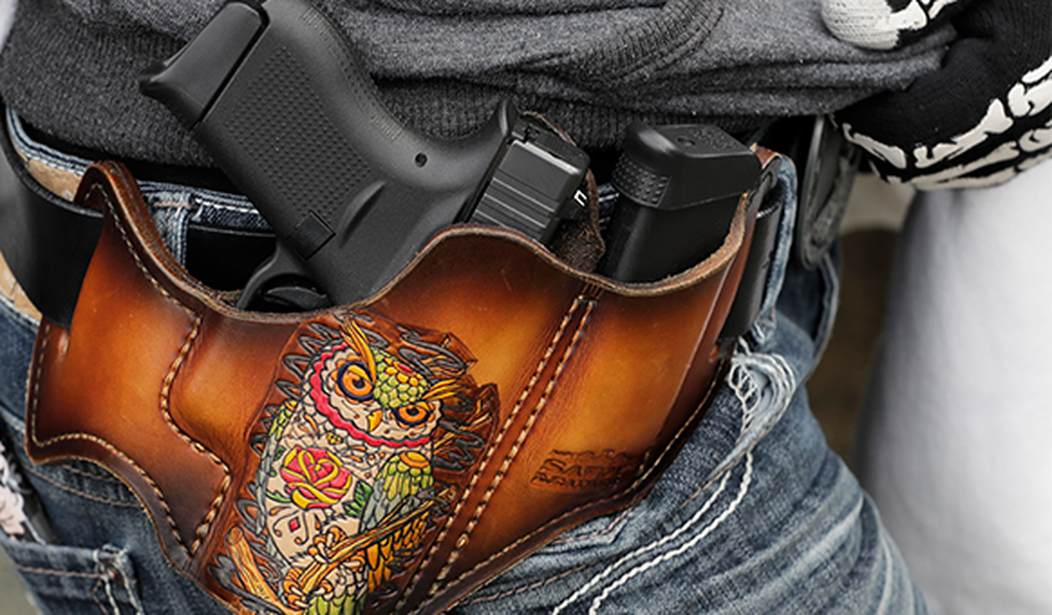It’s a big win for Second Amendment advocates, but Thursday’s decision by U.S District Judge Mark Pittman won’t immediately change Texas law. The judge has stayed his ruling for 30 days to give state time to appeal, which raises some questions about just how hard Republican officials will fight to keep the current ban in place, especially with polls suggesting a majority of Texas voters are in favor of some additional gun control measures including raising the age to purchase a rifle or shotgun from 18 to 21.
While that idea might be politically popular in some quarters, it would also be unconstitutional. Pittman struck down the state’s carry ban on adults under the age of 21 for the most obvious of reasons; that age group has clearly been able to access their Second Amendment rights throughout U.S. history, including at the time of the founding. From the judge’s opinion (citations omitted):
Are law-abiding 18-to-20-year-olds a part of “the people” mentioned in the Second Amendment? As explained below, the Court concludes that they are. To start, the Second Amendment does not mention any sort of age restriction. This absence is notable—when the Framers meant to impose age restrictions, they did so expressly.
Instead, the Second Amendment refers only to “the people,” which various Founding-Era dictionaries define as a reference to those who make up the “national community.”
In accord with that understanding, Heller said that “the people” is a term of art that refers to “all members of the political community, not an unspecified subset.” Heller’s interpretation found support in an earlier decision, United States v. Verdugo-Urquidez, which considered the Fourth Amendment’s reference to “the people.” There, the Court interpreted the phrase to encompass those “persons who are part of a national community” or those who have “sufficient connection with this country to be considered part of that community.” And without challenging Heller’s interpretation, Bruen said it was undisputed that “ordinary, law-abiding, adult citizens are part of ‘the people’ whom the Second Amendment protects.”
With this guidance, the Court asks a simple question: are lawabiding 18-to-20-year-olds properly considered members of the political community and a part of the national community? The answer is yes. And based on that answer, the Court concludes that law-abiding 18-to 20-year-olds are a part of “the people” referenced in the Second Amendment. This conclusion is unsurprising: Heller stated that the “Second Amendment right is exercised individually and belongs to all Americans.”
Pittman went on to point out that 18-to-20-year-olds clearly are able to exercise other constitutionally-protected rights, including the freedom of speech and the Fourth Amendment’s protections against unreasonable searches and seizures. As Pittman noted, the debates over the ratification of the Fourteenth Amendment didn’t include any discussion about whether it should apply to 18-year olds or be limited only to those over the age of 21. Especially with the voting age set at 18, it’s really hard to argue that 18, 19, and 20-year-olds are entitled to exercise every individual right except the right to keep and bear arms.
The Firearms Policy Coalition, which launched this legal fight last November, won a significant victory with Pittman’s ruling, but I’m very curious to see how the state will now respond. Officials could choose to simply give up their defense of the current ban on carrying for adults under-21, which would obviously thrill Second Amendment supporters but give political ammunition to Democrats like Robert Francis “Beto” O’Rourke ahead of the November elections, or it could appeal Pittman’s ruling to the Fifth Circuit, which would extend the legal fight well beyond Election Day but might also end up depressing turnout among gun owners, at least to a small degree.
Regardless of the political ramifications, Pittman made the right call. If Texas is looking for some sort of middle ground between a carry ban or allowing 18-year olds to carry under the state’s Constitutional Carry law legislators could always adopt a provisional concealed carry license for adults under the age of 21 as the state of Kansas has done, but simply barring young adults from exercising their right to bear arms in self-defense goes beyond mere regulation of that right and falls squarely into infringement territory.









Join the conversation as a VIP Member